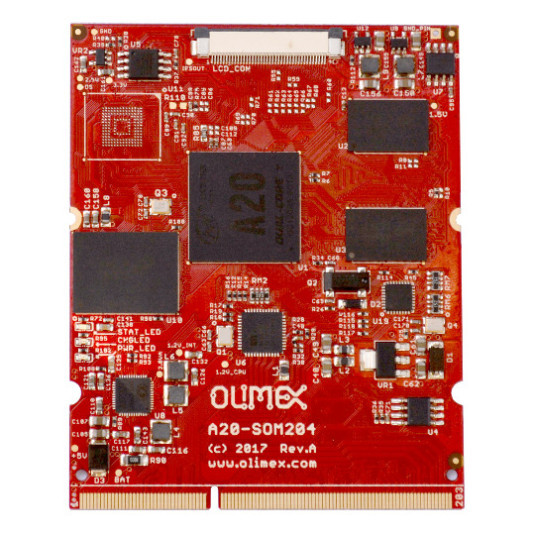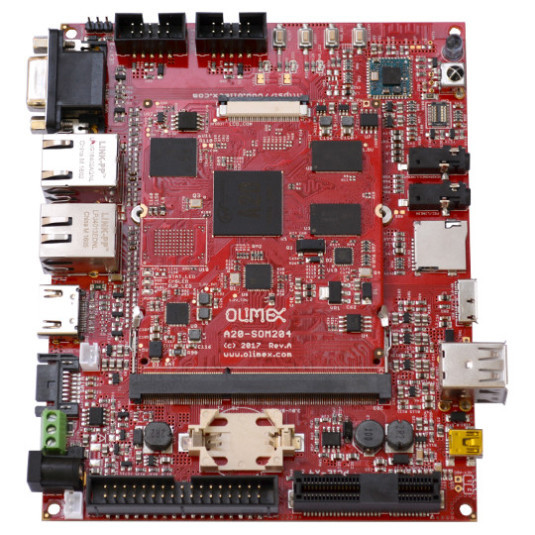Olimex has designed several system-on-modules (SoM) over the years for on various processors such as Rockchip RK3188, TI AM3352, or Allwinner A20, and each time they focus on exposing as many pins as possible from the SoC. That’s nice for some application, but it also means SoM with different processor are not compatible, and you can’t simply design a single baseboard for all those SoMs.
Olimex then realized many customers wanted an upgrade path for the SoM without having to redesigned the baseboard, and most were using the same common interfaces, so a family of compatible SoMs was needed. While there are already many system-on-module standards available, the company decided to roll their own SoM form factor based on the 204-pin SO-DIMM edge connector.
 The first SoM based on the standard will be A20-SOM204 powered by the popular Allwinner A20 processor. All SoM following this standard will expose the following interfaces through the edge connector:
The first SoM based on the standard will be A20-SOM204 powered by the popular Allwinner A20 processor. All SoM following this standard will expose the following interfaces through the edge connector:
- USB-OTG, 2x USB-HOST, HSIC, USB3
- PCIe
- 2x Fast/Gigabit Ethernet
- WiFi+BLE
- SATA, SD-CARD
- CAN
- IR
- CSI
- HDMI, VGA
- Audio In, Audio Out, SPDIF
- UEXT1 -> SPI1, I2C1, UART1
- UEXT2 -> SPI2, I2C2, UART2
There’s also a SOM204-EVB baseboard that should be compatible with all variants of those SoMs.
You’ll find some more information, including the schematics – about the current Allwinner A20 and EVB on the SOM204 page. The company expects to design SOM204 module based on Texas Instruments AM335x, Rockchip RK3399, and RK3288, meaning they’ll have a family of modules with the following options:
- Processor – Dual Core Cortex-A7 to Hexa Core Cortex-A72/A53
- System Memory – 1 to 4GB DDR3L
- Storage – 4 to 64GB eMMC
- Temperature Range – 0 to 70°C Commercial grade; -25 to +85°C Industrial grade
Long term supply will be guaranteed for the module, although not fixed amount of years has been given, and on the software side, Android and Linux will be supported, likely depending on the SoC used.
Pricing and availability information are unknown at this stage, but we do know they’ll keep on manufacturing the old models of system-on-module too.

Jean-Luc started CNX Software in 2010 as a part-time endeavor, before quitting his job as a software engineering manager, and starting to write daily news, and reviews full time later in 2011.
Support CNX Software! Donate via cryptocurrencies, become a Patron on Patreon, or purchase goods on Amazon or Aliexpress






I hope ‘RK3288’ is a typo just like ‘Cortex-A73’ (being an A72 in reality and me hoping for RK3328 instead)
@tkaiser
Well, given that the AM335x is a single-core A8, RK3288 is a quad-core A17, and RK3399 is a A72+A53, I think it’s safe to assume there are a few typos : )
@blu
Typos happen and with Olimex I’m not concerned about this (they’re not going Bananas but fix stuff as soon as they’re aware of). It’s just… when you think about that Olimex just invented a new SoM standard for ‘no reason’ (well, there’s SATA, x4 PCIe and GbE x 2 on the connector) I would expect they’re using SoCs that can benefit from their own new proprietary standard.
RK3288 is great in many areas (especially way more powerful than RK3328 when looking at CPU and GPU) but who needs this? Two times Ethernet (Fast Ethernet PHY even integrated) and maybe the fastest USB3 implementation on ARM we currently know (at least I’ve not dealt with a beefier one so far) should be more important than a theoretical faster CPU/GPU combo you can’t make much use of since heat dissipation on SoMs cramped in tiny spaces is such a shit show anyway…
Their SoM spec features SATA. With A20 you get the usual crappy Allwinner SATA ‘performance’, with A64 if they choose a reasonable USB3-to-SATA bridge write performance might slightly increase but read performance will be even more crappy than with A20, with RK3288 it will be the same and only with RK3399 or RK3328 they can provide their customers with really fast storage access. With RK3328 at a fraction of costs compared to RK3399.
@tkaiser
Do you have a website with the board(s) you’re designing and selling by any chance? You seem to have this way about you, you’re always sure to bring up the bad things (in your opinion) rather than the good.
Please release your tkaiser super-awesome flawless ARM dev board you’re hiding away from the rest of us!
I agree RK3288 is a good value for now, but if good rk3399 board are coming…it’s over.
Totally agree with the need to make the same SOM with RK3328, USB3 is very important to improve filesystem speed however no pci-e, bad for a dev SOM…maybe the reason they didn’t release a rk3328 som first.
I m wrong about pcie as rk3288 don’t have this interface.
The common of these 3 SOM (A20, RK3288 and RK3399) is the LCD output, without the motherboard eg develloping embedded device.
@bob
LCD support is pointless with a SoM standard not exposing this interface (or let’s better say these interfaces since various SoC vendors provide different ways to attach LCDs), there’s only HDMI and VGA (which AFAIK is an A20 only thing anway).
RK3288 while being extremely powerful wrt CPU and GPU cores is just boring for this use case since due to thermal issues you won’t benefit from high ‘sustained performance’ anyway in embedded situations and RK3288’s interface mix is as crappy as A64’s. Whereas RK3328 already provides two real Ethernet interfaces and a blazing fast USB3 implementation.
If Olimex prefers RK3288 over RK3328 then the only option to get any good highspeed interconnectivity with all their offerings will be the +100 bucks RK3399 SoM (welcome thermal issues again!). While with RK3328 for half the price ‘fast enough’ could be done (and to be honest: if I’ve to choose between ‘native SATA’ the Allwinner style which is just slow as hell and USB3-to-SATA with RK3328 I would always choose the latter since magnitudes faster than Allwinner’s ‘native SATA’). They could even put a VIA812 + JMS578 + RTL8153 on a RK3328 SoM and would still have something that’s at least ‘3 times faster in every area’ compared to an A20 SoM.
Well, useless to talk about this since the hardware facts should be known anyway. The funny/sad part of the story is that according to olimex.wordpress.com they seem to choose Rockchip SoCs based on software support experiences made with Allwinner SoCs in the past. For me as a software guy enjoying Linux running almost flawlessly on RK3328 already fulfilling some of the ‘Allwinner promises’ (at least wrt storage performance) this is simply strange. 🙂
I actually like that tkaiser points out, whats bad. Because its the bad things I have problems with.
Thanks for your reply!
It’s the way you put across those views that make people listen.
Don’t get me wrong I have a lot of respect for the guy as he does bring up some very valid points, the weak points of micro-usb for example.
He just doesn’t need to be so brash about everything.
Even more brash negativity spread in the meantime over at https://olimex.wordpress.com/ 🙂
@tkaiser
Brash negativity (read: constructive criticism) is what the current Arm SBC landscape needs most of all. The entire scene needs to get out of the garage stage and into the ‘predictably-good home computing’ stage. So I, for one, am perfectly fine with ‘brash negativity’, in hope that vendors eventually start listening.
Author: blu
Comment:
@tkaiser
Brash negativity (read: constructive criticism) is what the current Arm SBC landscape needs most of all. The entire scene needs to get out of the garage stage and into the ‘predictably-good home computing’ stage. So I, for one, am perfectly fine with ‘brash negativity’, in hope that that vendors eventually start listening.
I really hope they do listen to him!
And lastly, apologies to tkaiser if any of my comments offended you.
I know you’re seriously fed up with the state of ARM boards but belittling (A.K.A negative “constructive criticism”) gets people nowhere. Please for the love of god, work with manufacturers and design your own board already! As the old saying goes “Put up or shut up”.
Anyway, this is the last thing I’ll say on the matter, life is too short.
still no announcement on when this will be available 🙁